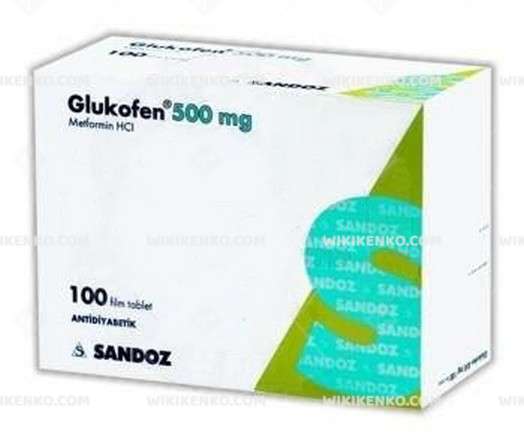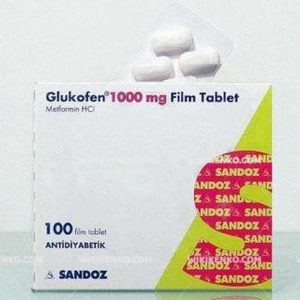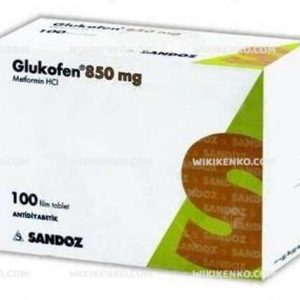Glukofen Film Tablet 1000 Mg
Glukofen Film Tablet 1000 Mg is a medication that contains 1000 mg of metformin hydrochloride in each film-coated tablet. It is available in blister packs of 100 tablets. It is white in color, oblong, biconvex, and has notches on both sides.
| Dosage form | |
|---|---|
| Pack size | |
| Potency | 1000 Mg |
| Manufacturer | |
| Origin | |
| Generic Name (Ingredient) | Active Substance: Each Film-Coated Tablet Contains 1000 Mg Of Metformin Hydrochloride. |
Assuming your emergency circumstances for this product, visit Urgent Quotation page. Besides, for any pharmaceutical questions, please ask us in the comments section.
Description
What is it Used For?
Glukofen belongs to a group of drugs called oral antidiabetics (biguanides). These drugs are specifically used to treat diabetes. Insulin, a hormone produced by the pancreas, allows the body to take up glucose (sugar) from the blood.
In individuals with diabetes, the pancreas either produces insufficient insulin or the body cannot use it properly, resulting in high blood glucose levels. Glukofen works to lower blood glucose levels as close to normal as possible.
Glukofen is primarily used to treat type 2 diabetes (non-insulin-dependent diabetes), particularly in overweight patients, when diet and exercise alone are insufficient to control blood sugar levels. Adults can take it either alone or in combination with other diabetes medications (oral drugs or insulin). Children and adolescents aged 10 years and over can also use Glukofen, either alone or in combination with insulin.
Side Effects
Like all medications, Glukofen may cause side effects. The most common side effects of Glukofen include dyspepsia, nausea, and diarrhea. When used alone, it does not lead to hypoglycemia. However, it may potentiate the hypoglycemic effects of sulfonylureas and insulin.
If any of these common side effects persist or become bothersome, it is advisable to consult a healthcare professional. These side effects may include diarrhea, gas, headache, indigestion, nausea, stomach upset, temporary metallic taste, or vomiting.
In rare cases, excessive metformin accumulation in the body can lead to a serious (sometimes fatal) condition called lactic acidosis. This condition is more likely to occur in older adults or individuals with kidney or liver disease, dehydration, heart failure, heavy alcohol use, or those undergoing certain medical procedures or using specific drugs.
If any symptoms of lactic acidosis, such as unusual tiredness, dizziness, severe drowsiness, chills, blue/cold skin, muscle pain, fast/difficult breathing, slow/irregular heartbeat, or stomach pain with nausea/vomiting/diarrhea, are experienced, immediate medical help should be sought.
It is essential to note that not everyone experiences side effects, and many individuals take Glukofen without any issues. If there are concerns about the side effects or any other medication, consulting a doctor is highly recommended.
Can I Take Glukofen with Other Medications?
Yes, Glukofen can be taken alongside other medications, including other diabetes treatments such as insulin, sulfonylureas, or glitazones. However, informing the healthcare provider about all medications being taken, including prescription and over-the-counter drugs, vitamins, and herbal supplements, is crucial. Some medications may interact with it, affecting its efficacy or increasing the risk of side effects.
A doctor’s guidance is essential in determining the safety of combining Glukofen with other medications.
The Difference Between Glukofen and Other Diabetes Medications
Glukofen, an oral antidiabetic medication, belongs to the class of drugs known as biguanides. It functions by reducing the liver’s production of sugar and improving the body’s response to insulin. This, in turn, helps lower blood sugar levels in individuals with type 2 diabetes.
Various other classes of oral antidiabetic medications work differently to lower blood sugar levels, including:
- Sulfonylureas: Stimulating the pancreas to produce more insulin, which aids in lowering blood sugar levels.
- DPP-4 inhibitors: Blocking the action of an enzyme called DPP-4, leading to increased levels of hormones that stimulate insulin production and decrease glucose release from the liver.
- SGLT2 inhibitors: Blocking glucose reabsorption in the kidneys, resulting in increased glucose excretion in urine and lower blood sugar levels.
- Thiazolidinediones: Improving the body’s sensitivity to insulin, enabling more effective use of insulin to lower blood sugar levels.
The choice of medication depends on individual factors, such as the severity of diabetes, other medical conditions, and potential side effects. It is essential to work closely with a doctor to identify the right medication or combination of medications for effective diabetes management.
Conclusion
Glukofen Film Tablet 1000 Mg, containing metformin hydrochloride, plays a vital role in the management of diabetes by effectively lowering blood sugar levels. As an oral antidiabetic medication, it belongs to the class of biguanides, working to reduce sugar production in the liver and enhance insulin response. Its benefits are crucial in treating type 2 diabetes patients, especially when diet and exercise alone prove inadequate.
Understanding the potential side effects and interactions with other medications is essential for safe and effective use. For personalized diabetes management, consulting with a healthcare professional is paramount.
Use the form below to report an error
Please answer the questions as thoroughly and accurately as possible. Your answers will help us better understand what kind of mistakes happen, why and where they happen, and in the end the purpose is to build a better archive to guide researchers and professionals around the world.
The information on this page is not intended to be a substitute for professional medical advice, diagnosis, or treatment. always seek the advice for your physician or another qualified health provider with any questions you may have regarding a medical condition. Always remember to
- Ask your own doctor for medical advice.
- Names, brands, and dosage may differ between countries.
- When not feeling well, or experiencing side effects always contact your own doctor.
Cyberchondria
The truth is that when we’re sick, or worried about getting sick, the internet won’t help.
According to Wikipedia, cyberchondria is a mental disorder consisting in the desire to independently make a diagnosis based on the symptoms of diseases described on Internet sites.
Why you can't look for symptoms on the Internet
If diagnoses could be made simply from a textbook or an article on a website, we would all be doctors and treat ourselves. Nothing can replace the experience and knowledge of specially trained people. As in any field, in medicine there are unscrupulous specialists, differences of opinion, inaccurate diagnoses and incorrect test results.





Reviews
There are no reviews yet.